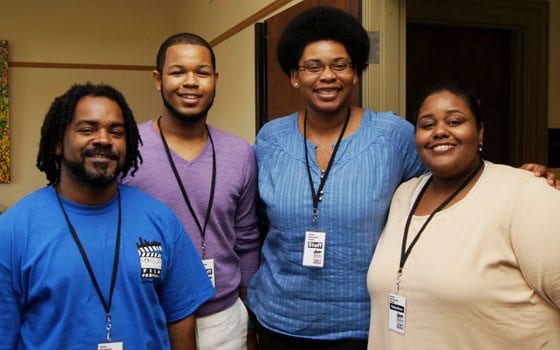

Top: RIFF volunteers Sam Jackson of Dorchester, Sharif Butler of Dorchester, Catherine Morris of Brockton and Pascale Martineau of Roslindale kept the festival running smoothly all weekend. Morris said that they have been working on this event for months and will work through August to wrap up the festival.
In an age of Netflix, iPods and laptops, the Roxbury International Film Festival (RIFF) has done something remarkable — bring people together to watch movies.
Thousands of film lovers flocked last weekend to the 12th annual RIFF. The event showcased more than 50 films — including comedies, dramas, shorts, documentaries and youth works — and engaged filmmakers and film buffs in a variety of workshops and panel discussions.
As New England’s largest film festival for people of color, the RIFF has drawn more than 30,000 attendees since its inception in 1999, and has featured more than 450 independent films by or about people of color.
“You don’t find too many film festivals that cater to people of color, that focus on the root, the essence of people of color and what they do,” noted Catherine Morris, one of the festival’s many volunteers.
The festival was born from a partnership between The Color of Film Collaborative, and ACT Roxbury, a program of the Madison Park Development Corporation. The Dudley Film Festival, as it was known then, provided a venue for local filmmakers of color — many of whom were not featured in other festivals.
The festival gave a “voice to the voiceless,” said co-Founder and co-Producer Lisa Simmons.
Over time, the entry criteria for the festival changed. No longer exclusively for filmmakers of color, the festival now accepts films that celebrate people of color — regardless of the filmmaker’s color.
As its thematic reach expanded, so did its geographic reach. Soon, entries from outside the city, outside the state, and outside the country were pouring in — this year, the RIFF received nearly 300 film entries and spent six months recruiting films domestically and abroad.
Last week’s festival featured not just filmmakers from Roxbury, but from Africa, South America and Asia as well.
As a result, festival organizers decided to change its name to the Roxbury International Film Festival to reflect its growing diversity.
But Simmons insists that this new global reach does not detract from the festival’s commitment to local filmmakers. Film is a fundamentally collaborative medium, she explained. Many people come together to produce a film, and many people come together to view it.
So expanding a film’s reach — getting more people involved — will also expand a filmmaker’s opportunities, by creating wider audiences and greater networks.
“I think the important thing about film festivals is creating a space where filmmakers can do the business of film as well as exhibit their film,” Simmons said at the RIFF’s opening night last Thursday at Hibernian Hall.
“It’s really important that the industry understands that Roxbury is a place to come to buy films, to pick up films and to pick them up with distribution.”
In addition to showcasing films, this year’s festival also offered workshops and panel discussions for filmmakers. These sessions, many of which were run by industry professionals, were designed to help burgeoning filmmakers understand the ins and outs of screenwriting, auditions and distribution.
“It’s a filmmaker’s festival,” Simmons said. “We want to affect change for filmmakers.”
Topper Carew, a reknown filmmaker and panelist at this year’s festival, echoes that sentiment. While working in Los Angeles as a television and film producer, the Roxbury native was first invited to participate in the festival in 2003. Carew happily accepted, and since then, has never looked back.
The RIFF inspired his “personal filmmaking renaissance” — after 2003, Carew decided to “reinvent” himself from a hit network television producer of such hits like “Martin” into a serious documentary filmmaker.
Now Carew devotes himself to what he calls “conscious content,” films that tackle important issues like education and youth violence to “ignite positive consciousness in the community.”
Like Carew, other filmmakers at last week’s RIFF grappled with urgent social questions, like immigration, the aftermath of Hurricane Katrina, transracial adoption and the American political process.
More than in Hollywood, Simmons explained, independent films reflect the world around them — and frequently take on the difficult topics that no one else wants to talk about.
After Hurricane Katrina and September 11, the RIFF saw an increase in sad and introspective films — before each of these events, films had a much more up-beat tone. Simmons characterized this year’s films as “concerned,” reflecting a country beset by an economic recession and on-going violence abroad.
Festival Programmer Terri Brown agreed, and explained that the RIFF deliberately selects films that wrestle with the happenings of the world — so the tone of the RIFF changes from year to year.
But for Catherine Morris, a RIFF volunteer since 2007, one thing has stayed the same. “It’s been wonderful — I wouldn’t trade it for anything in the world,” she said. “It’s like coming home.”






